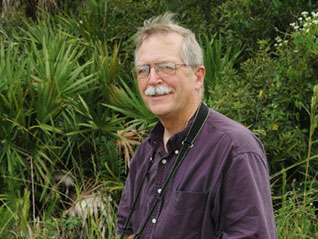
Photographed by Bette Jackson
If you are have difficulty playing the audio click here
Length of Segment: 00:01:30
Hi, I'm Dr. Jerry Jackson, out with the wild things. Turkey vultures are late risers as birds go. Not because they sleep more, but because they wait for winds or thermals that allow efficient soaring. Flapping-flight is energetically expensive and turkey vultures have mastered the art of taking advantage of a free lift. As the ground heats up in the morning, the hot air rises, and a turkey vulture has only to lift its wings to sail off in search of food. Wind can allow an early departure, however, especially if the turkey vultures roost on a cliff or building such as they do on the Dade County Courthouse. Morning sea breezes strike the courthouse and are deflected upward, providing the vultures with an elevator to breakfast. Roosting turkey vultures can often be seen perched with outstretched wings. At times, they're testing the air currents and readying themselves for a lift-off. At other times, they may be hanging their wings out to dry. Dew collected on their feathers overnight reduces a vultures’ soaring efficiency, and getting them dry first is important. A turkey vulture may also hold its wings open and exposed to the sun to regulate its body temperature and perhaps to combat feather parasites. Such nuances of vulture behavior celebrate the complexity of interactions between these birds and their environment.
'With the Wild Things' is produced at the Whitaker Center in the College of Arts and Sciences at Florida Gulf Coast University. For 'The Wild Things', I'm Dr. Jerry Jackson.< Back to Vultures
For permissions please contact the owning institution. WGCU Public Media, 10501 FGCU Blvd. S., Fort Myers, FL 33965




